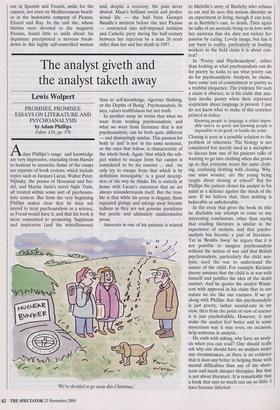The analyst giveth and the analyst taketh away
Lewis Wolpert
PROMISES, PROMISES: ESSAYS ON LITERATURE AND PSYCHOANALYSIS by Adam Phillips Faber, £10, pp. 376 Adam Phillips's range and knowledge are very impressive, extending from Hamlet to humour to anorexia. Some of the essays are reprints of book reviews, which include topics such as Jacques Lacan, Walter Pater, Nijinsky, the poems of Housman and Sei- del, and Martin Amis's novel Night Train, all treated within some sort of psychoana- lytic context. But from the very beginning Phillips makes clear that he does not intend to treat psychoanalysis as a science, as Freud would have it, and that his book is more committed to promoting 'happiness and inspiration (and the miscellaneous) than to self-knowledge, rigorous thinking, or the Depths of Being'. Psychoanalysis, he says, values truthfulness but not truth.
In another essay he writes that what we want from reading psychoanalysis, and what we want from literature that is not psychoanalysis, can be both quite different — and dismayingly similar. This passion for both 'is' and 'is not' in the same sentence, or the ones that follow, is characteristic of the whole book. Again 'that which the sub- ject wishes to escape from but cannot is considered to be his essence ... and we only try to escape from that which is by definition inescapable' is a good descrip- tion of the way he thinks. He is entirely at home with Lacan's statement that an act always misunderstands itself. But the trou- ble is that while his prose is elegant, these repeated givings and takings away become tedious as they are not genuine paradoxes but poetic and ultimately uninformative prose.
Anorexia in one of his patients is related 'We've decided to go away this Christmas.' to Melville's story of Bartleby who refuses to eat and he sees this serious disorder as an experiment in living, though it can lead, as in Bartleby's case, to death. Then again he talks of an anorexic being so in love with her anorexia that she dare not violate her passion by eating. Lovely image, but has it any basis in reality, particularly as leading workers in the field claim it is about con- trol?
In 'Poetry and Psychoanalysis', rather than looking at what psychoanalysis can do for poetry he looks to see what poetry can do for psychoanalysis. Analysts, he claims, have some sort of commitment to poetry as a truthful eloquence. The evidence for such a claim is obscure, as is his claim that ana- lysts invoke poetry when their repressed scepticism about language is present. I just do not know what to make of this sentence printed in italics: Knowing people in language is either impos- sible and/or no good: and knowing people is impossible or no good, or beside the point.
Cloning is seen as a possible solution to the problem of otherness. The biology is not considered but merely used as a metaphor to discuss how one of his patients talks of wanting to go into clothing when she grows up so that everyone wears the same cloth- ing, confusing clothing with cloning. Why, one must wonder, are the young being taught about cloning at school? But for Phillips the patient clones his analyst in his mind as a defence against the shock of the new. If we believe that, then nothing is believable or unbelievable.
In the essay that gives the book its title he disclaims any attempt to come to any interesting conclusions, other than saying that reading literature is similar to the experience of analysis, and that psycho- analysis has become a part of literature. Yet in 'Bombs Away' he argues that it is not possible to imagine psychoanalysis without the notion of war and that British psychoanalysts, particularly the child ana- lysts, used the war to understand the nature of the child. For example Kleinian theory assumes that the child is at war with himself and justifies the idea of the death instinct. And he quotes the analyst Winni- Gott with approval in his claim that in our nature we are like our enemies. If we go along with Phillips that this psychoanalytic is just poetry, rather second-rate in my view, then from the point of view of science it is just psychobabble. However, it may make the analyst feel better and in some mysterious way it may even, on occasion, help someone in analysis.
He ends with asking, why have an analy- sis when you can read? One should really ask why one should have an analysis under any circumstances, as there is no evidence that it does any better in helping those with mental difficulties than any of the short- term and much cheaper therapies. But that is not about literature. It is remarkable that a book that says so much can say so little. I have become infected.





























































































 Previous page
Previous page